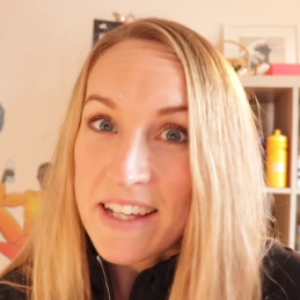
7.5K
Downloads
40
Episodes
Jeremy has always had a passion for developing primary pedagogy to improve children’s learning. As a trainee he was told “The children love being taught by you, now make sure they all learn something!” So began his quest for excellence. Since that day he has been judged by Ofsted to be an outstanding teacher and an inspirational school leader. He has been Commended in the Headteacher of the Year Awards and he is a Fellow of the Chartered College of Teaching. On his journey he has been helped by numerous outstanding teachers and this podcast is a way of helping teachers learn from the wisdom of others, just as he did.
Episodes

Wednesday Mar 23, 2022
What I wish I knew about Maths and things with Gill Haysham
Wednesday Mar 23, 2022
Wednesday Mar 23, 2022
Gill Haysham is the guest for the final episode this term.
Gill is a Freelance Education Adviser for Mathematics who works mainly in Essex supporting teachers in primary schools and training new teachers. For 12 years prior to that she worked for Essex Local Authority as a Mathematics Adviser. All this after qualifying from university with a 2.1 in Mathematics and Education.
Now if you think that sounds like Gill must know an amazing amount about great teaching and learning in maths you would be right! But don’t just take my word for it. Following some training that Gill led in an Essex school, one of the participants said, “Gill is the best consultant I have worked with or had training from ... by far! Her relaxed and calm personality instils confidence, with fantastic enthusiasm and passion for the subject.” And if you listen to the podcast you will see why that comment was made.
In this podcast we discuss ...
- The importance of telling children that if they work hard and don't give up then anything is possible. The teacher is responsible for giving this message endlessly until the children believe it.
- The likely disconnect between our own upbringing and that of the children who may have experienced a very different childhood to that of the teacher. This can be an emotional shock.
- Why lots of teachers still have maths anxiety because they aren't confident with the why and how of teaching maths and developing mastery.
- The pluses and minuses of wearing a toga in a lesson on Roman roads.
- How having an A level in Maths and a degree certainly help with subject knowledge but you still have to learn how to teach maths to children who don't find it easy. Children have many gaps in their knowledge and fall down many misconception holes and it is our job to get them out!
- The importance of doing the maths yourself so you can understand the possible difficulties that children may encounter, especially when you are inexperienced or unsure about the lesson you are teaching. This is the most important tip for teaching maths.
- Why experience will make you a better teacher, as great teachers spend their careers on the path to improvement and never stop learning.
- The value of a self-supporting, collaborative classroom if you want great learning. You have to make sure you give the children useful things to think about, then help them to articulate their thoughts.
- When children make mistakes their brains are ready to listen. So children have to share half-formed ideas even if they are wrong. Real understanding takes time, so if you want children to develop mastery be patient, slow down and go deeper.
- Simply taking the maths from the page in the text book will not lead to confident mathematicians. Teachers have to make maths real and live and relevant for every child if concepts are to be mastered.
You can contact Gill on:
Email - maths@gillhaysham.co.uk
Gill's website - gillhaysham.co.uk
We'll be back with more educational chat in the summer term!

Wednesday Mar 16, 2022
What I wish I knew with Stephen Saunders
Wednesday Mar 16, 2022
Wednesday Mar 16, 2022
If your job is to eat a frog, what do you do first thing in the morning? Eat the frog of course. What's that got to do with teaching I hear you ask? Well listen to the podcast and you will find out. It is just one of the many words of wisdom that Stephen Saunders shares with us. Having trained in Manchester University, he moved to Essex to take up his first teaching job and he has been here ever since. When his current school achieved an outstanding grade from Ofsted the report stated that, ‘The deputy headteacher provides a very strong teaching role model’. And that is why we are talking to him today. He is an expert teacher and he has so much to share.
In this podcast we discuss ...
- The importance of starting in a school that fully supported his development as a new teacher played a key part in him becoming the great teacher he is today.
- Why you should not believe everything you are told, even if it is your most skilled colleagues telling you. The book by David Didau, 'What if everything you knew about education was wrong?' was inspiring and led Stephen to challenge his beliefs about what made outstanding practice.
- Your ability to respond to the children's needs in each lesson is essential for their progress and your development as a teacher. If you learn the skills to adapt what you are doing to match what children need they will learn very effectively.
- Tough days and long days all become worthwhile when children get those light bulb moments and truly enjoy their learning. That feeling that you have made a difference is what makes teaching special and great teachers get that feeling alot.
- Dealing with parents was a challenge when Stephen first started teaching, as he didn't always let parents finish speaking before becoming defensive about what had happened. He soon learnt that he needed to let parents talk, find out what the problem really was and then decide how to progress.
- The benefits of taking risks with teaching to get better learning far outweighs the drawbacks, so never be afraid to try new ideas that you think will improve what you do. Inexperienced teachers are often overly scrutinised and this can make them feel there is only one way to do something. This can be very restrictive to developing highly effective pedagogy.
- The value of working walls is greatly enhanced if they provide a scaffold for children's thinking. This ensures the children can use their working memory for the most challenging aspect of a task.
- Set your expectations high. Teachers must have a relentless drive and an unshakeable belief that every child can achieve, for only then can all children reach their potential.
- Why is there a red table/group, a blue table/group, a green table/group? And why do the children on the red table (lower attaining) always stay on the red table? Surely this can't be right?
- Children can do some remarkable things. If they are working at the edge of their comfort zone, encouraged, supported and challenged they will definitely achieve success. Make no excuses for children underachieving as it does them no favours.
- Find the time to keep reading yourself so you can continually extend your subject and pedagogical knowledge. Continually developing yourself is essential so you can do the very best for your class.
- Reflecting on what you could have done better in each lesson will lead to your rapid development as a teacher. As you build up your experiences of teaching sequences you will quickly build effective practice. Keeping a notebook of what went well and what didn't go so well will help you to do this in the quickest time.
- And finally ... eat the frog! To find out more, you'll have to listen to the podcast if you haven't heard this phrase before, but it's a great bit of advice!


Wednesday Mar 09, 2022
What I wish I knew with John Cosgrove
Wednesday Mar 09, 2022
Wednesday Mar 09, 2022
Teaching is in the blood for John Cosgrove, as his parents and other family members have all been part of this glorious profession. In almost 40 years of teaching, John has seen just about everything. During his career he taught across England in secondary schools (as a French and Spanish teacher), before transitioning to primary schools, where he went on to become a headteacher. He also wrote articles, news items, blogs, plays and books, both fiction and non-fiction, that have been published widely. And he even found time to stand in a general election as a prospective MP. He came very close to being elected too, losing out narrowly to athletics icon Sebastien Coe. After a lifetime in education, John knows the impact that great teachers have on the students they teach, and the importance of making a difference.
In this podcast we discuss ...
- Why teaching is worth investing time in. You always make a difference, but it may not always be instant, in fact it may be many years later that you find out just what difference you made.
- How realising that a boy who rarely behaved well couldn't actually hear a word John was saying. The boy had moved school many times and he had slipped through the net. John picked up the problem, the boy had grommets fitted and he was transformed. So much so that he called out to John years later when he saw him in the town.
- Why teachers who resort to shouting are not helping anyone - not the child who is being shouted at, not the other children who don't like it, and not the teacher (especially when an accident occurs at the point of shouting!). There are many better ways to help children behave better, so make sure you use them.
- How he was greeted on walking in to his first class. A young teenage girl at the back commented, "Ugh, look what the f**k just walked in!" It was a tough start and made John consider whether he could carry on, but it turned into such a valuable learning experience. This made John realise how important it is to be protective towards NQTs (ECTs) and how important it is to seek help from more experienced colleagues, as they helped him to manage the situation.
- The value of asking colleagues to come and observe you so they can support you. One teacher told John he was doing little wrong but that he wasn't looking after the most important resource in the room ... himself. This was the most important lesson he ever learnt and it is the most important lesson for ECTs today.
- After the only formal observation John had in his NQT year, which lasted 5 minutes and was carried out by the headteacher right at the end of his first year, John was told he had passed. Very different to today!
- How dealing with the anxiety of always thinking you need to do more and that you are never good enough should be the priority for every new teacher, as you can't teach your best when you are worrying all the time.
- Having a laugh with your class is an essential part of every day, even if the young children don't always get your jokes!
- Seeing a child do something that they couldn't do without your intervention is what gives you a buzz in teaching.
- During John's first inspection, the lead inspector told the staff that if the school was judged as satisfactory, as many schools are, then you are doing the job you are paid for. And that is as true today, even though the pressure of accountability is much greater. You can always be better, but be satisfied when you are doing a good job.
- The joy of working holistically with primary school children was what tempted John to end his career in secondary schools. The chance to influence every aspect of children's learning and development is just wonderful.
- How John almost won a seat in parliament as an MP having stood against Sebastien Coe no less. Just a few thousand votes was all that stood between him and Westminster.
- One of the marks of a successful classroom are smiles and laughter. This tells you that there is joy in learning.
- The way young children still experience regular awe and wonder in the world around them is refreshing. These wow moments are so important for children and for the teacher. When children go home and excitedly tell their parents what they have been learning, you know you have got things right.
You can connect with John on ...
Twitter John Cosgrove (@johncosgrove405) / Twitter
You can find out about John's books at ...
Amazon.co.uk: John Cosgrove: Books, Biography, Blogs, Audiobooks, Kindle
You can read John's blog at ...
John Cosgrove – Retired Headteacher, Author and Freelance Writer (wordpress.com)

Wednesday Mar 02, 2022
What I wish I knew with Ilse Melligan
Wednesday Mar 02, 2022
Wednesday Mar 02, 2022
After 1 year of teaching Ilse was wondering if teaching was the job for her. Working in a school where the headteacher bullied everyone had left her disillusioned by a career in education, even though she loved teaching her class and working with her very supportive colleagues. Having plucked up the courage to change schools, which was no easy task due to the unpleasantness she had to go through to make it happen, Ilse realised that teaching was definitely what she wanted to do. This inspiring podcast shares the lows and many subsequent highs of Ilse's varied career in education, and how her own experiences helped her to realise the importance of improving heath and wellbeing education for primary aged pupils, so that they can take care of themselves physically and mentally for the rest of their lives. This led her to set up The Children's Health Project in 2016. She now works with hundreds of schools and helps the staff and children to live their best possible life, whatever circumstances they find themselves in.
In this podcast we discuss ...
- How brilliant friends and amazing teachers at primary school, who were creative and passionate about their job, made school so exciting that she became keen to teach.
- The importance of loving what you are teaching and enjoying learning with the children in your class.
- The fact that great teams matter and everyone needs to commit to make where you work as good as it can be. So love the place you work and love the people you work with for then you will be able to do your best.
- The way inspiring leaders, inspire others to achieve great things.
- Getting away from bullies in the work place as soon as you can is essential. Never accept it or put up with it. Working with a cruel person is very harmful and may make you quit. It definitely doesn’t happen in many schools, so look around and find the place where you can thrive. Seek out the support of others to help you get you through situations like this.
- Having secret phone calls in the pre-mobile era was the way that Ilse escaped from her horrific situation.
- How returning to the school where she had been bullied as a teacher was a good experience, as the new headteacher welcomed her, explained that the culture was now very different and invited her to come back any time.
- How special it is to be a teacher and being able to spend time with the children, especially your first class.
- Being aware of the influence you have as a teacher on the children you teach. This can never be underestimated. How do we know? Because some contact their old teachers many years later due to the special pupil-teacher bond that was formed.
- Developing your classroom community as a safe and secure environment is a good thing for everyone. Prioritise people at all times, because it’s not what you say and do as a teacher that is most important, it’s how you make the people feel that matters most.
- Learning can be difficult, but any time a child is struggling then make sure you listen really hard to what the child tells you about what is making learning tough on any particular day.
- Why sports days are special events for everybody if the school culture is right. You must try to make it an event for everyone to enjoy, not just those who love competing.
- Being engaged in physical activity is a right for everyone and must be promoted so that we are ensuring every child can be physically active.
- Using sport to enhance self-esteem can be really powerful. And not just for those who are great at sport. It is an opportunity for all when done in the right way.
- Creating joy through achievement can be done in many ways and is different for different people.
- Making sure that all members of the school are really clear about what doing the best for everyone means and looks like every minute of every day.
- How The Children’s Health and Wellbeing Project takes a positive approach to wellbeing. Don’t spend endless time warning pupils what not to do, teach them about all the great things they can do so they can take care of themselves. It's learning for life.
You can contact Ilse on ...
LinkedIn Ilse Melligan FCCT
For more information on Ilse's ground breaking work Home - The Children's Health Project

Wednesday Feb 23, 2022
What I wish I knew about working with children with special needs with Melissa Stead
Wednesday Feb 23, 2022
Wednesday Feb 23, 2022
"Children with special needs bring so much joy, they’re so lovely, they’ve got so much to give and they are an important part of our society". So says Melissa Stead who always wanted to be a teacher of children with special needs. In her career she has been a mainstream primary school teacher, a special educational needs teacher and she is currently a special educational needs and disabilities coordinator.
Melissa has seen some distressing practice in different countries - adults chained to beds at night, babies stacked in cages, children slapped for touching toys, but she has only positive things to say about how lucky she is to work with children with special needs and to actually get paid for doing it! In short, you've guessed it, she absolutely loves it.
In this podcast we discuss ...
- Why some people are afraid of the unknown and are unsure how to speak to children with special needs or how to react to them.
- Anyone who works with people with special needs deserves the total respect of society as they do great work even though it can be very challenging.
- The importance of talking to a child with special needs in the right way. We should never talk about the autistic child but the child with autism, just as we should never refer to someone as a naughty child but as a child who needs help to change certain behaviours.
- Trauma perceptive practice - a fantastic program that looks at where the children's behaviour is coming from so they can be helped to regulate their 'emotional pots' so they don't become overwhelmed.
- Every child has some form of special need. The teacher's job is to make sure that the most important needs for each child are supported in the best way possible.
- How the introduction of PECS (picture exchange communication system) transformed a 14 year old boy's communication so that he could talk in sentences having been non-verbal.
- The joy of seeing a boy in a walking race run as fast as he could to the end of the track whilst laughing all the way. His classmates cheered him on and, as he hadn’t always got on too well with them, it was lovely to see them do this.
- Taking a boy with cerebral palsy trekking in the Lake District in his electric buggy.
- The scary moment when a KS3 boy got so excited at the beach that he ran fully clothed into the sea and started swimming, whilst two teachers (also fully clothed) chased after him to pull him out.
- Staying calm is essential when problems occur. Although you might have a churning stomach, on the outside you must look totally unflustered so that everyone else stays calm.
- When the swimming pool was unexpectedly closed, one boy was so upset that he got changed into his swim shorts back at school and lay on the carpet swimming.
- How laughing with the students is essential. Make sure school is a fun place and, when funny things happen, enjoy them with the children - don’t take life and education too seriously.
- In education we rarely get moments to just consolidate our good practice as we are always looking for improvement. So make sure that you only change something you are doing because you think it will truly make the education better.
- As a young teacher it would have been so valuable to know more about the children’s individual needs.
- Focusing on reading and teaching children how to read should be the priority for every ECT.
- Managing other adults in a way that develops team work is hard but crucial. To work successfully as a team you have to share ideas and respect the views of others, even if you don’t always agree. LSAs can provide great support to a new teacher by sharing their expertise so make full use of this.
- Make sure the LSA works with all children not just those with additional needs. The teacher must work regularly with these children to accelerate their progress.
- If you’re not making someone else’s life better then you are wasting your time. Your life will become better by making other lives better.
You can connect with Melissa on
https://www.linkedin.com/in/melissa-stead-5088b8214
To find out more about Melissa's work visit

Wednesday Feb 16, 2022
What I wish I knew about wellbeing with Maria Brosnan
Wednesday Feb 16, 2022
Wednesday Feb 16, 2022
Maria Brosnan is a specialist. What in? Well amongst other things she's a coach, mentor and trainer in wellbeing and her expertise has never been more needed than it is now.
For over 15 years she was MD and co-founder of two educational companies that created award-winning resources The Story Spinner and Striver. As a consultant and coach, she has worked with numerous clients, from schools to multinationals including British Airways, the Body Shop and Burberry.
Now, through her company Pursuit Wellbeing, she dedicates her time to the wellbeing of teachers, school leaders and other school staff and helps them to manage stress, anxiety and daily school pressures, using practical, research-driven information and support.
As well as offering online wellbeing training for school staff, she also hosts a podcast and has published a book for teachers ‘The Pursuit of Sleep’.
In this podcast we discuss ...
- The 5 key things that all teachers can do to protect their wellbeing.
- Being good is good enough as perfectionism is the enemy of wellbeing. When you are teaching 30 individuals for 6 hours a day it is not possible to be perfect, so just strive to be as good as you can be each day.
- Taking the pressure of yourself by making sure the children are working really hard and focusing your efforts on making sure they are all learning something.
- Listening to your mentor or your trusted colleagues. When they tell you to rest, then rest! If they say enough is enough, then it is. They have been there and they have seen what needs to be done to become a great teacher.
- The art of teaching is complex as there are so many things to learn and you can't learn them all at once. It takes years to master the art of teaching.
- Perfect lessons happen rarely, if ever. So be happy with what you have done as a teacher when you can't think of anything you could have done to make the lesson better.
- There is a real value in reflection but the tendency to beat yourself up when things are not perfect must always be resisted. Focus much more on the things you are doing well and spend a sensible amount of time thinking about one thing you could do to improve.
- Make sure you maintain strong connections with family and friends and do this very regularly. Spend quality, happy, joyful times with them every week. We all stay healthy by having fun, so have plenty of it away from your role as a teacher.
- Chat, chat, chat, share, share, share especially when you are feeling anxious. This is one of the key ways we learn to manage our emotional state and cope with the challenges we face every day as teachers.
- Small, everyday choices matter. Do you have a short walk everyday? Do you eat a healthy snack? Do you have an early night? The small healthy choices have a massive impact on our wellbeing. Make the right choices and the crash that many of us have at the end of term due to being physically and emotionally exhausted can be avoided.
- A tiny bit of preparation really helps us make good choices. For example, short meditations are so good for you so make time for these every day. Or develop visualisations to help you let go of feelings that are unhelpful. (A link to some of Maria's 3 minute meditations is at the bottom of the blog).
- Take responsibility for your own wellbeing. Don't expect others to do it for you. Each of us has responsibility to do whatever we can to care for ourselves. Others can help, but you must do as much as you can to take steps to look after yourself. It's in your hands.
- MENDS - the 5 things you must do all the time to enhance your wellbeing: 1.Mindfulness 2.Exercise 3.Nature 4.Diet 5.Sleep.
You can connect with Maria on:
Twitter https://twitter.com/mariabrosnan
Her website https://pursuitwellbeing.com/
Her 3 minute meditations can be accessed through this link

Wednesday Feb 09, 2022
What I wish I knew with Wendy Cobb
Wednesday Feb 09, 2022
Wednesday Feb 09, 2022
Don't you just love experts! I do, and I'm talking to one in this podcast. Wendy Cobb has extensive experience working in a number of primary and secondary schools across Kent, London and Essex in a variety of teaching, leadership, advisory and coaching roles. That alone would make her a great person to listen to as she has so much to tell. But Wendy has done much more than work in schools. Indeed, she has the most varied educational CV of anyone I know. She currently works at Canterbury Christchurch University as the Lead for Primary ITE in a number of priority areas, plus, she is the Academic Link Tutor for the PGCEi in collaboration with The City School Pakistan, a leadership coach for the Achievement for All charity ... I could go on, as there is so much more! Suffice to say, Wendy knows what great teachers do, so she is well worth listening to.
In this podcast we discuss ...
- How Wendy developed a love of teaching even though it wasn't the thing she'd always wanted to do.
- Why becoming a teacher after doing other things helped her. Wendy believed she wouldn't have been very good in her 20s, unlike the current crop of new teachers, and that being a parent really changed her perspective on how to be a great teacher.
- The importance of teaching the child not the number. The emphasis on data used to leave Wendy cold. Of course she read the grades passed on by the previous teacher but then put them away for a month so she could focus on the potential of the child. Often the previous data didn’t match what the child was capable of, indeed it could be completely different.
- What to do when your tutor turns up unexpectedly to do a lesson observation and you had planned a lesson to collect information for a college assignment.
- The value of building on children's ideas and letting them lead the learning so that they become fully involved in the lesson and have total commitment to their work.
- Teaching is tricky but it's wonderful too. The sparky lessons aren't possible every day but when they come enjoy them fully and remember them when there are tougher times.
- How using time effectively doesn't mean that you always get on with the learning immediately, as you will often need to spend some time getting children into the right emotional state to make the children ready for learning.
- Being brave enough to do what you feel is right for a child, even if you don't know the theory behind your judgement. Trust your instinct if you feel it will benefit the child.
- What you need to do when the builders start using a pneumatic drill right outside your classroom door.
- Always get your TA, cleaners and caretaker on side. They will be great supporters of you as a new teacher.
- How she welcomed visiting teachers from Japan into her classroom to watch her teach a maths lesson before the school caretaker decided that would be the ideal time to take down her blackboard and put up a whiteboard! Mayhem ensued and Wendy wondered if she would become a celebrity on the Japanese version of Candid Camera!
- Great moments are often hard to identify until some years after they happen. One boy Wendy taught in primary school decided to become a teacher after being inspired by Wendy. Then she taught him again when he was a trainee teacher.
- 'Pick up the pieces' by the Average White Band might not be the first choice for Tudor dancing, but Wendy used it to energise the children for their final performance and they loved it.
- Playing with the curriculum is well worth doing. Don't lose the fun things that children love because this enhances the learning for everyone.
- Building positive relationships with difficult children and classes is what will make the difference in how hard they work and how well they behave. But this takes time, so be patient.
- How even the most successful, experienced teachers have very difficult classes and challenging times. Whilst these are tough, you will succeed in the end.
- 3 final things to think about (taken from one of Wendy's blogs): be open to your own difficult feelings and those of others; empathise and connect with everyone you meet; think about the things you can influence and focus on those.
You can connect with Wendy on Wendy Cobb | LinkedIn
You can listen to Wendy's blogs here: https://blogs.canterbury.ac.uk/expertcomment/?s=wendy+cobb
She has also just published a book which focuses on language, culture, identity and wellbeing

Wednesday Feb 02, 2022
What I wish I knew with Lucy WiIliams
Wednesday Feb 02, 2022
Wednesday Feb 02, 2022
Lucy Williams has just completed the first term of her teacher training. She has worked with children for the last 18 years, so she definitely started young. She studied child development at GCSE, then completed a diploma at college, before gaining a 1st class honours degree at university. And now she’s putting all of that study into practice by training to teach.
In this episode we discuss ...
- How a fabulous male teacher helped Lucy face each day and cope with the death of her father when she was only 7 years old.
- The importance of developing a range of strategies for dealing with learning difficulties, in Lucy's case dyslexia.
- The need to be strong, resilient and tough enough to get through the hard times. You can do anything you want to if you are willing to work hard enough.
- How being a child minder, SENCO in a nursery, working on a children’s ward in a hospital (including with young oncology patients), were all experiences that helped Lucy develop her understanding of how to help children get the most from every situation.
- Why you must make the most of every day however tough it is. You have to find something positive even on bad days because if you give off positive feelings these will be mirrored back to you.
- How having great mentors like Sharon Jakobek and Rhian Fisk make anything possible.
- That training to be a teacher is tough but you have to keep your foot on the accelerator to make sure everything that needs to be done is done.
- Why you have to recognise your achievements so that you can look back with pride at all you have done. When you go through those times when you are losing confidence or imposter syndrome is taking a hold, this is an effective coping strategy.
- Bringing out children's natural smiles and seeing them succeed, is the best possible feeling. This is reason enough to become a teacher.
- Getting positive feedback from parents, such as when they thank you for making their life easier in the mornings because their child wants to come in to school, is such a good feeling.
- The importance of reflecting on your difficulties in class so you can take immediate action to address an aspect of your teaching that could be improved. See this as development and explain to the children why the situation has to change so both you and the children can achieve more. Don’t brush issues under the carpet; tackle them and move on.
- Being consistent with children is an essential element to becoming a great teacher. They have to know what you expect of them every day so the way to be successful in class is absolutely clear. Make sure there is no ambivalence. This is a great lesson!
- The value of scaffolding to give children ownership of their learning and the confidence that they can overcome problems on their own. This makes them become more independent and helps them to believe they can achieve.
- When one person is teaching, two people are learning.
- Why observations are so valuable so don’t get overly stressed. Embrace them and realise that they are going to be great learning opportunities that will be really valuable as long as you respond positively to them.
- Enjoy the moment, trust your children, show them you care and love them and value them. They are the next generation so nurture them, give them great learning opportunities and help them to become a great citizen. Be yourself. Be unique. That’s what children deserve.

Wednesday Jan 26, 2022
What I wish I knew about behaviour with Graham Chatterley
Wednesday Jan 26, 2022
Wednesday Jan 26, 2022
Graham Chatterley is a former SEMH school leader who recently started his own training company. Having experienced a huge range of behaviour as both a Primary and Secondary teacher, Graham then started work in an EBD setting in 2007. Graham has now left his school leadership role to train and consult full time. He published his first book ‘Building Positive Behaviour’ last year.
Graham has led training for thousands of Educators across the North of England. He has great insight into how successful practice in a specialist setting can be transferred to mainstream schools. He believes that developing a supportive ethos and culture will always achieve better outcomes than quick fix strategies and believes the adults play a pivotal role in the behaviour of the students. This approach not only benefits every child, but it has an enormous impact on staff wellbeing.
Graham is the Director of Changing Perceptions Limited, where the training and support to schools is designed to do just that.
In this podcast we discuss so much, including ...
- Are you a teacher of a subject or are you a teacher of children?
- Is the grade more important or is it the child? It has to be child first.
- Prioritising as a teacher is the key element to creating a great environment for learning. The things that you can’t measure by testing are probably the most important ones to focus on.
- The idea that children are choosing to misbehave or be naughty is usually untrue. In reality the reason is unlikely to be any sort of conscious choice by the child.
- Why teachers may blame themselves for poor behaviour when actually it is very unlikely to be their fault. If teachers believe it is personal it will only damage the relationship between the adult and the student and this will make things worse.
- How using an authority figure approach failed miserably when Graham first became a teacher and it was only when he developed a more personable, positive approach with some of the children he found difficult to work with that things started to improve.
- Shifting the focus to developing children’s social and emotional wellbeing was when the penny dropped for many staff. That was the point when Graham started delving deeper and deeper into understanding why children behaved as they did.
- If support is provided at the right time in mainstream schools then most children will succeed in that setting. It works in other countries so there is no reason why it shouldn’t work here.
- When a child is feeling anxious then the wrong part of the brain is activated and the child won’t be able to learn effectively.
- Accepting behaviour mistakes are learning opportunities. It’s how we teach every other subject. Everything we do at school is about using corrections productively. Why is children’s behaviour treated any differently?
- Those children who don’t know how to behave should not be punished when they get things wrong. If you want to learn the guitar but play it badly because you don’t know how to do it and get punished then you will never want to play again!
- It's all about mindset. Put yourself in the child’s shoes before you start deciding what to do.
- Behaviours generally come from 3 different places. Fear responses leading to lashing out, survival responses which lead to avoidance, overwhelmed responses leading to irritating problems getting bigger and bigger. Adults can usually self-regulate, some children can’t. We need to teach them how.
- The most dangerous phrase in education is ‘It’s what we’ve always done.’ There can be great resistance from adults to move away from the status quo and use new approaches.
- Early intervention is always the key if you want to avoid crisis point. Lots of little, low level interventions across the day will have a very positive impact on anxious children and will often prevent them from reaching crisis point.
- Choices can work if children are slightly wobbling but won’t work if children are in distress. Once they are distressed then children are unable to make choices.
- How Graham came to write his first book entitled, 'Building Positive Behaviour: Returning to learning using a Sequential Approach', which was prompted by his concern for the the authoritarian views of the government's behaviour tsar.
You can connect with Graham on:
Twitter graham chatterley @grahamchatterl2
LinkedIn graham chatterley | LinkedIn
You can listen to him on The soundtrack to your teaching career (teacherhug.co.uk)
Or buy his book Building Positive Behaviour: Returning to learning using a Sequential Approach : Chatterley, Graham: Amazon.co.uk: Books
Apologies for not publishing the podcast last week. This was due to a family bereavement.
Apologies too for the inconsistent quality of the audio in this podcast. It was a bad WiFi day!

Wednesday Jan 12, 2022
What I wish I knew with Lorraine Wilkinson-Rouse
Wednesday Jan 12, 2022
Wednesday Jan 12, 2022
A 'friend' once told Lorraine she wasn't clever enough to be a teacher. What! This is the woman who worked full time as she did an Open University degree, studied and passed her English, Maths and Science GCSEs and gained a Level 3 in Forest Schools, whilst making sure during all of this that her family were well looked after and fully supported. Now if that is not a definition of a superwoman, I don't know what is! Not clever enough? Never has a comment been more inappropriately made. Lorraine has now completed her first term as an ECT and in this podcast we discuss how she has achieved her dream of being a teacher. As the famous song from the Rocky Horror show goes ... 'Don't dream it, be it'. And that is exactly what Lorraine has done.
In this podcast we discuss …
- The importance of putting your heart and soul into whatever you want to do because then you can achieve anything, as long as you work hard and are willing to struggle through the hard times.
- The fact that the harder you work, the luckier you become and the more you achieve.
- How overcoming adversity to achieve your dream is well worth it. You have one life so live it to the max!
- What it was like as the class teacher on day 1 and the surreal feeling of looking over your shoulder expecting someone else to come in and take over, before realising that no-one is coming because you are the teacher.
- That you have to be brave enough if something is not working to make a quick decision and change it, so think on your feet and don’t be afraid to adapt what you are doing. If the air hostess on a plane is panicking then you know it’s bad news, so if your TA looks worried that’s a good sign that things aren’t going too well.
- The work-life balance as an ECT compared to being a trainee is much better. It’s good to be able to just focus on the teaching and not the assignments and all the other things you have to do as a trainee.
- How essential it is to be prepared. Get everything ready for the next day before you go home so you can have a relaxing start to the day, as this will impact on the children when they come in to class.
- Avoiding the photocopying queue by going at times when it’s not busy!
- Asking for help and support as there is no silly question that other people haven't asked before you, especially when you are new and learning.
- Working with a great team makes so much difference to how quickly you settle in as a new teacher. With a great team you can quickly feel like you’ve been there forever and that you really belong.
- Making best use of your time so that after working long weeks of 50 hours plus during term time you can relax in the holidays knowing that you have done the best you could.
- Knowing that giving it all you’ve got, believing in yourself whatever anyone tells you, and being yourself is enough.
- Reacting to someone saying you aren’t good enough to do something by using their words to energise yourself and prove them wrong.
- Knowing that you must be doing something right when your daughter wants to follow in your footsteps and be a teacher too after seeing what you do.
